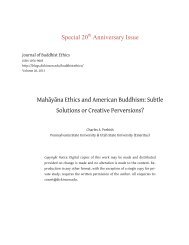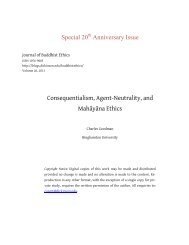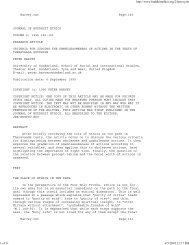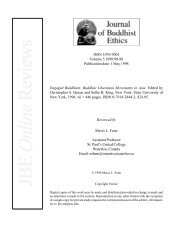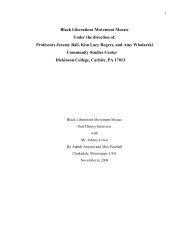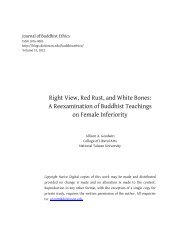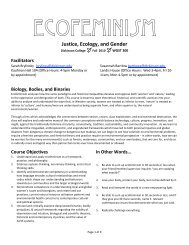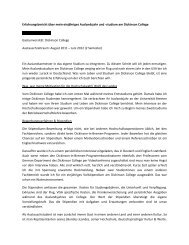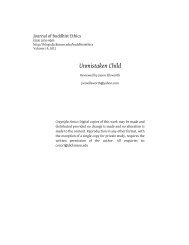Read article - Dickinson Blogs
Read article - Dickinson Blogs
Read article - Dickinson Blogs
Create successful ePaper yourself
Turn your PDF publications into a flip-book with our unique Google optimized e-Paper software.
Barstow, Between Abstinence and Indulgence 92<br />
tation of the proper mantras and prayers can benefit the animals and so<br />
reduce meat’s negativity. His followers are thus able to continue cultivat-<br />
ing compassion and expressing concern for the welfare of animals without<br />
fully renouncing meat. At the same time, it is important to recognize that<br />
Jigmé Lingpa does not claim that purifying meat makes it fully acceptable.<br />
Not only did Jigmé Lingpa never make such a claim, but the practice of<br />
praying over meat before eating it serves as a constant reminder that meat<br />
is a fault requiring purification. Such a practice, therefore, can be seen as<br />
an attempt to bridge the tensions surrounding the consumption of meat by<br />
recognizing its sinful nature, while also allowing those unable to fully re-<br />
nounce it the ability to continue practicing compassion.<br />
Jigmé Lingpa was not unique in using prayer to temper the nega-<br />
tivity associated with meat, as can be seen in the Autobiography of the ear-<br />
ly twentieth century female lama Sera Khandro (se ra mkha’ ‘gro, 1892-<br />
1940). Sera Khandro was a lifelong vegetarian, but at age thirty she be-<br />
came ill and was advised to eat meat for a month, thereby restoring her<br />
strength and leading to recovery. She only ate this meat, however, after<br />
purifying it through prayers (356). Further, once she recovered her health,<br />
she returned to her customary vegetarian diet, indicating that despite hav-<br />
ing purified the meat through prayer, a fully vegetarian diet remained<br />
preferable. For Sera Khandro, as for Jigmé Lingpa, prayers recited over<br />
meat could reduce meat’s negativity, but not negate it entirely.<br />
In addition to offering such prayers, Jigmé Lingpa was also clear<br />
that he expected more from certain categories of individuals with regard to<br />
eating meat than from others. Above, we saw an extended quote from<br />
Jigmé Lingpa’s Autobiography, laying out his case that meat was inappro-<br />
priate because the animal had previously been one’s mother. Speaking<br />
about the villagers, Jigmé Lingpa reflected, “They are worldly people, so<br />
they do not recognize that all beings were their mothers. Thus they are<br />
able to kill them. But how can we dharma practitioners eat it without in-



